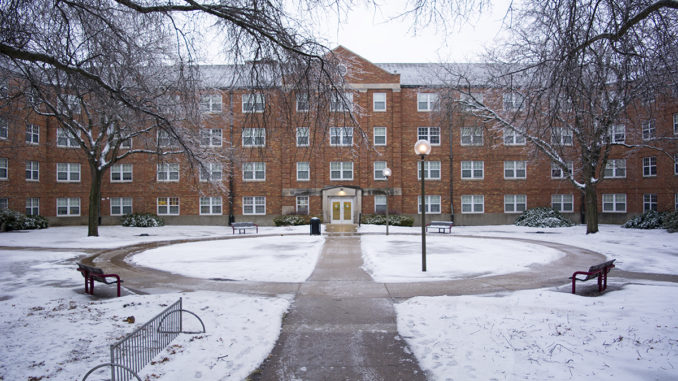
Starting Jan. 15, students will be able to register to live in Truman State University’s first on-campus pet-friendly housing for next year in Dobson Hall.
In an effort to increase enrollment, retention and residence hall occupancy, Dobson Hall has been reopened for next fall to accommodate pets.
An email went out to staff before winter break, and the Residence Life website has been updated with tentative information about pet housing.
ResLife Director Jamie Van Boxel said the idea of pet-friendly housing came from Tyana Lange, vice president for enrollment management and marketing, and Janna Stoskopf, vice president for student affairs.
Both new and returning students have shown interest in the pet-friendly housing, Van Boxel said.
According to the Overview of Pilot Program document, the project could help students create a sense of home on campus by providing companionship in the form of a pet that might improve student mental health, enhance academic performance and create an enhanced sense of belonging on campus.
For this spring’s housing renewal and housing selection, students will have to make a commitment to register a pet— with the exception of two people — to live in Dobson, Van Boxel said.
Van Boxel said there are two rooms that are deluxe doubles where two students who each have a roommate will be allowed to have a pet, but they themselves will not be allowed to have one. This pet limitation is because the University won’t allow more than one pet living in a room for the wellbeing of the animal.
Even students who do not plan to bring a pet to campus can apply to live in the pet-friendly housing.
In each single occupancy room, the pet owner can reside with either one cat, one dog, one rabbit or two small caged animals.
All residents who bring pets are required to pay pet fees of $50 per semester for dogs and cats and $25 per semester for all other approved pets.
All dogs and cats must be spayed or neutered, at least nine months old and have been under the primary care of the resident or their family for at least three months prior to moving the pet to campus.
Pit bulls, rottweilers, German shepherds and all wolf hybrids have been prohibited from living in the pet-friendly housing, as well as any dogs over 40 pounds.
“The folks that wrote the policy, their guidance was, ‘What were other universities doing?’ and after seeing the first draft of the policy I did my own review of all the other universities and it’s fairly common to have a list of breeds that are prohibited from living on campus,” Van Boxel said.
Still, fish in 10 gallon tanks or smaller are permitted to live in any on-campus housing without needing to register the pet or pay the pet fees.
Reptiles, ferrets and birds are still restricted from all residence halls.
There are no restrictions for students with service animals. For emotional support animals, once a student has been approved to have an ESA through the office of Student Access and Disability Services, there are no restrictions to where they can live.
The future of pet-friendly housing is still unclear, as it will depend on how students react to the hall policy, according to the Overview of Pilot Program document.
“Based on experiences at other campuses, it will take a few years to build on the idea and see results in terms of additional on campus students,” Dave Rector, vice president for administration, finance and planning, said.
Closing Dobson saved Truman over $200,000 for the current budget year, Rector said.
Rector attributed the savings primarily to salary and benefits costs for a hall director, custodial staff and student assistants. He also said there were some savings on utilities, like water and electricity.
“To reopen a floor will not require the same staffing,” Rector said. “We anticipate covering housekeeping using current staff.”
Van Boxel said the University will not be hiring a new hall director to look over Dobson, but an existing hall director will take on Dobson in addition to their current hall.
There will be a student adviser for the first floor, and that student adviser will belong to a staff of a different building, Van Boxel said.
“Years down the road, if pet-friendly housing is super popular and there’s a demand to open multiple floors then yes, I believe the intention would be to have a hall director in that building just as we have a commitment to have a hall director in the other buildings,” Van Boxel said.
